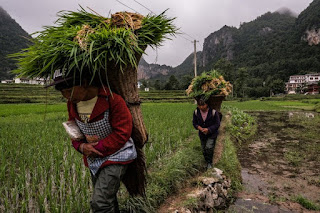Carbon Dioxide Not So Good For Agriculture
Plants consume carbon dioxide and intuitively we feel that it's concentration in the atmosphere should have a positive effect on them. However, research now shows that rice grown in higher levels of carbon dioxide has lower amounts of several important nutrients.
 |
| Rice farmers in southeastern China. More than 2 billion people worldwide rely on rice as a primary food source.Bryan Denton for The New York Times |
When scientists want to figure out how climate change might disrupt the world’s food supplies, they often explore how rising temperatures could shift growing seasons or how more frequent droughts could damage harvests.
In recent years, though, researchers have begun to realize that the extra carbon dioxide that humanity is pumping into the atmosphere isn’t just warming the planet, it’s also making some of our most important crops less nritious by changing their chemical makeup and diluting vitamins and minerals.
Now, a new study has found that rice exposed to elevated levels of carbon dioxide contains lower amounts of several important nutrients.[....]
The potential health consequences are large, given that there are already billions of people around the world who don’t get enough protein, vitamins or other nutrients in their daily diet.
In the study, published Wednesday in Science Advances, Dr. Ziska and his colleagues exposed experimental rice fields in China and Japan to the same elevated levels of carbon dioxide that are expected to occur worldwide later this century as a result of fossil-fuel burning and other human activities.
Most of the 18 varieties of rice that were grown and harvested contained significantly less protein, iron and zinc than rice that is grown today. All of the rice varieties saw dramatic declines in vitamins B1, B2, B5 and B9, though they contained higher levels of vitamin E.More details can be found at the links above. This is not good news. We're going to have 8 billion people on this planet to feed by 2050, and we have to hope that somehow we'll be able to aggressively increase agricultural output, in particular nutritional, through the use agricultureal science, and that's going to have to include genetic modification about which I've posted about before.


Comments
Post a Comment